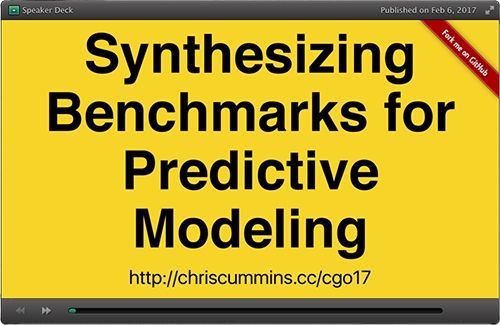https://github.com/chriscummins/clgen
Deep learning program generator
https://github.com/chriscummins/clgen
benchmarking big-data deep-learning gpu lstm machine-learning neural-network opencl synthetic-programs
Last synced: 10 months ago
JSON representation
Deep learning program generator
- Host: GitHub
- URL: https://github.com/chriscummins/clgen
- Owner: ChrisCummins
- License: gpl-3.0
- Created: 2016-09-10T18:29:20.000Z (over 9 years ago)
- Default Branch: master
- Last Pushed: 2023-12-04T22:16:58.000Z (about 2 years ago)
- Last Synced: 2025-03-30T18:22:22.577Z (11 months ago)
- Topics: benchmarking, big-data, deep-learning, gpu, lstm, machine-learning, neural-network, opencl, synthetic-programs
- Language: Python
- Homepage: https://chriscummins.cc/pub/2017-cgo.pdf
- Size: 8.75 MB
- Stars: 106
- Watchers: 7
- Forks: 30
- Open Issues: 17
-
Metadata Files:
- Readme: README.md
- Contributing: CONTRIBUTING.md
- License: LICENSE
Awesome Lists containing this project
README
-------


Maintainer: fivosts. See BenchPress for a more recent version. BenchPress also supports CLgen models.
**CLgen** is an open source application for generating runnable programs using
deep learning. CLgen *learns* to program using neural networks which model the
semantics and usage from large volumes of program fragments, generating
many-core OpenCL programs that are representative of, but *distinct* from, the
programs it learns from.

## Getting Started
First check out [INSTALL.md](/INSTALL.md) for instructions on getting the build
environment set up .
Then build CLgen using:
```sh
$ bazel build -c opt //deeplearning/clgen
```
Use our tiny example dataset to train and sample your first CLgen model:
```sh
$ bazel-bin/deeplearning/clgen -- \
--config $PWD/deeplearning/clgen/tests/data/tiny/config.pbtxt
```

#### What next?
CLgen is a tool for generating source code. How you use it will depend entirely
on what you want to do with the generated code. As a first port of call I'd
recommend checking out how CLgen is configured. CLgen is configured through a
handful of
[protocol buffers](https://developers.google.com/protocol-buffers/) defined in
[//deeplearning/clgen/proto](/deeplearning/clgen/proto).
The [clgen.Instance](/deeplearning/clgen/proto/clgen.proto) message type
combines a [clgen.Model](/deeplearning/clgen/proto/model.proto) and
[clgen.Sampler](/deeplearning/clgen/proto/sampler.proto) which define the
way in which models are trained, and how new programs are generated,
respectively. You will probably want to assemble a large corpus of source code
to train a new model on - I have [tools](/datasets/github/scrape_repos) which
may help with that. You may also want a means to execute arbitrary generated
code - as it happens I have [tools](/gpu/cldrive) for that too. :-) Thought of a
new use case? I'd love to hear about it!
## Resources
Presentation slides:
Publication
["Synthesizing Benchmarks for Predictive Modeling"](https://github.com/ChrisCummins/paper-synthesizing-benchmarks)
(CGO'17).
[Jupyter notebook](https://github.com/ChrisCummins/paper-synthesizing-benchmarks/blob/master/code/Paper.ipynb)
containing experimental evaluation of an early version of CLgen.
My documentation sucks. Don't be afraid to get stuck in and start
[reading the code!](deeplearning/clgen/clgen.py)
## License
Copyright 2016-2020 Chris Cummins .
Released under the terms of the GPLv3 license. See
[LICENSE](/deeplearning/clgen/LICENSE) for details.

